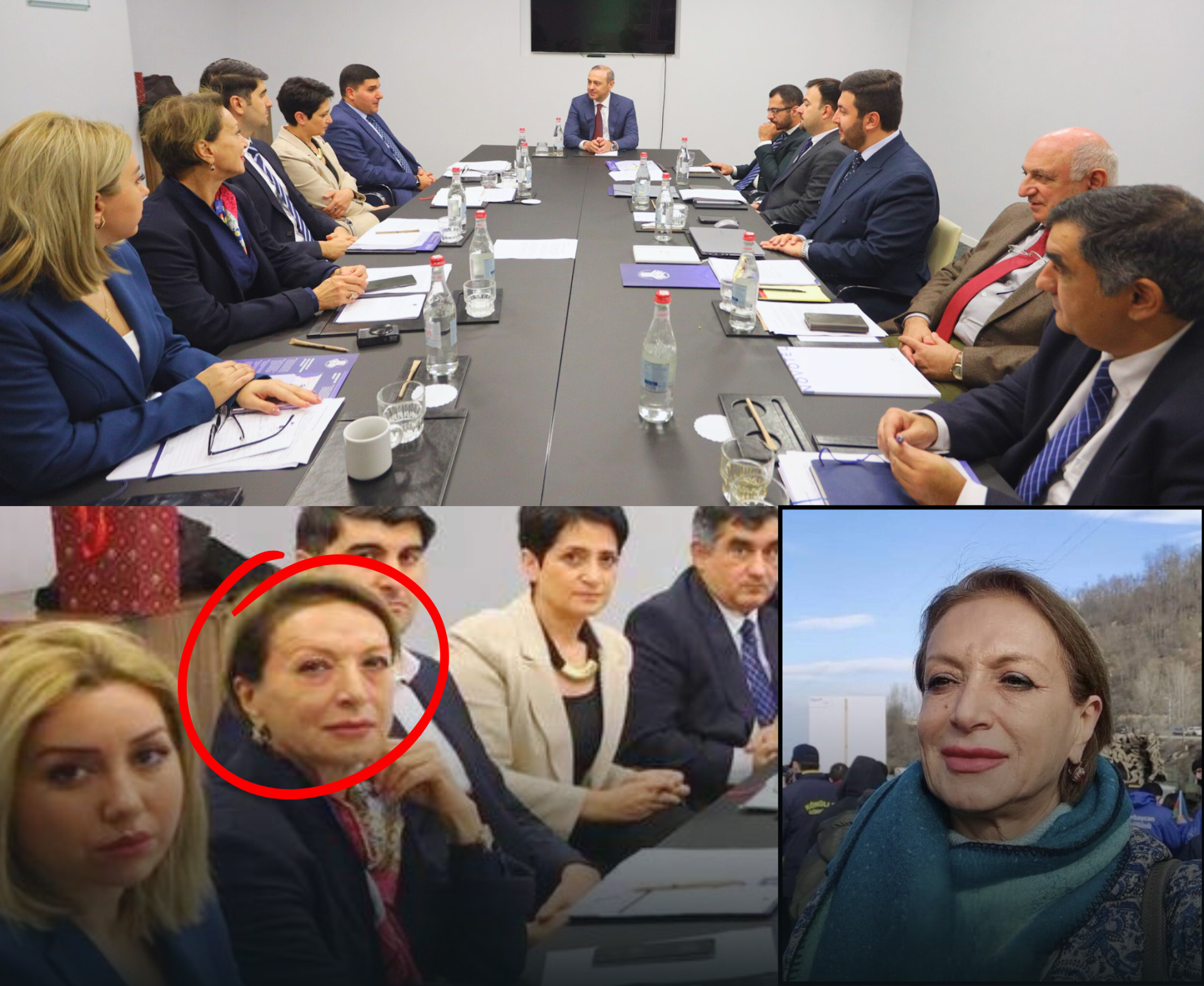Azerbaijani pseudo “eco-activist” Dilara Efendiyeva, who helped organize the blockade of Artsakh (Nagorno-Karabakh) that starved 120,000 Armenians, arrived in Yerevan on October 21 as part of an Azerbaijani delegation attending a “civil society dialogue” presented under the so-called peace agenda. Her participation — as a guest welcomed by Armenian authorities — has sparked outrage and condemnation across Armenia.
Efendiyeva, who heads the “Women: Peace and Security” Center under the Dilara Aliyeva Azerbaijan Society for the Protection of Women’s Rights, has close ties to the Azerbaijani government and was among the organizers of the 2022–2023 blockade that cut off Artsakh from food, medicine, and humanitarian aid for nine months.
On October 21–22, representatives of Armenian and Azerbaijani civil society and expert communities held a bilateral roundtable discussion in Yerevan. The event was organized by the Center for Security Policy Research in Armenia with support from official structures of both countries and was hosted at the DoubleTree by Hilton Hotel.
According to the organizers, the discussions focused on the peace agenda that followed the August 8 meeting in Washington, confidence-building measures between societies, potential economic cooperation, and the establishment of direct and long-term connections between civil representatives. Participants were seated in a mixed arrangement rather than on opposite sides, emphasizing informality and dialogue.
Flight data reviewed by Radar24 confirmed that the Azerbaijani delegation arrived in Yerevan on a direct Azerbaijan Airlines (AZAL) flight from Baku, marking the first such flight in nearly 30 years. Some outlets, citing flight-tracking data, reported that an Azerbaijan-registered business jet (tail 4K-ASG) landed at Zvartnots around 4:00 p.m. and departed about an hour later.
Armenia’s Secretary of the Security Council, Armen Grigoryan, also met with the representatives of the two countries. Grigoryan praised the holding of such meetings, emphasizing that they strengthen peace and foster interpersonal communication between peoples. Civil society representatives thanked the Armenian side for organizing the event and ensuring a positive atmosphere, while Grigoryan later answered questions raised by the participants.
However, news of the meeting triggered widespread public backlash, with many Armenians expressing outrage that individuals directly involved in the blockade of Artsakh were hosted in Yerevan under the banner of “peace.”
The Armenian side was represented by Areg Kochinyan, Boris Navasardyan, Naira Sultanyan, Narek Minasyan, and Samvel Meliksetyan. The Azerbaijani side included Farhad Mammadov, Rusif Huseynov, Ramil Iskandarli, Kamala Mammadova, and Dilara Efendiyeva.
Armenian investigative outlet Fip.am earlier reported that in December 2022, Efendiyeva was among the so-called Azerbaijani “eco-activists” who blocked the Lachin corridor — the only road connecting Artsakh with Armenia, at the time under Russian peacekeeper supervision.
In a video released that month, Efendiyeva claimed that the activists were ready to allow ambulances and provide medical access.
“As one of the organizers of this protest, I want to confirm that we are ready to open the corridor for emergency and medical aid vehicles,” Efendiyeva said in the video.
In subsequent interviews with Azerbaijani state media, Efendiyeva denied Baku’s responsibility for the humanitarian crisis, falsely claiming that Armenians of Artsakh left because they were “misled by their leaders” and asserting that many were willing to live under Azerbaijani rule.
However, the Artsakh Ministry of Health reported that patients in critical condition could not be transferred to Yerevan, as the Lachin road remained fully blocked. The blockade continued for nine months, culminating in Azerbaijan’s September 2023 military offensive that forced the entire Armenian population of Artsakh — around 120,000 people — to flee to Armenia. Efendiyeva, who helped organize the blockade, has since been widely condemned for her role in what Armenians describe as an act of ethnic cleansing and a mockery of Armenia’s pursuit of peace.
Among the Azerbaijani delegation was Farhad Mammadov, Director of the Center for Strategic Studies under the President of the Republic of Azerbaijan, a government-affiliated think tank. In many of his Facebook posts, the pro-Aliyev researcher refers to Armenia’s capital as “Irevan,” a term widely interpreted as a territorial claim on Armenia.
In a post about his Yerevan visit, Mammadov highlighted the bilateral format of the meeting, noting that, for the first time, an Azerbaijani plane landed at Zvartnots Airport.
“The meeting was organized at a high level, with security ensured, and a wide range of issues were discussed, from regional geopolitics to topics that raise concerns in both societies,” he said. “Of course, it was interesting to walk around Yerevan, to see everything that one studies and observes daily through the media.”
Mammadov also stressed that the discussions were organized directly by Armenian and Azerbaijani participants, without third-party mediation, expressing hope that such dialogues would continue.
Also among the Azerbaijani delegation was Rusif Huseynov, co-founder and director of the Baku-based Topchubashov Center. Earlier, on September 22, the deputy director of the Topchubashov Center, Murad Muradov, visited Armenia to participate in the 108th Rose-Roth Seminar of the NATO Parliamentary Assembly in Yerevan.
Other participants included Ramil Iskandarli, Chairman of the Board of the Azerbaijan National NGO Forum, and Kamala Mammadova, chief editor of 1News.az, a distinctly pro-government outlet known for spreading anti-Armenian propaganda.
It comes as no surprise that only pro-government figures were present in Armenia, as Azerbaijan has intensified its crackdown on independent voices.
On June 20, the Baku Court of Serious Crimes sentenced seven journalists from the independent outlet Abzas Media to prison terms ranging from seven and a half to nine years on fabricated charges such as “money laundering” and “tax evasion.” The International and European Federations of Journalists condemned the verdict as a politically motivated attack on press freedom.
That same month, Azerbaijani researcher and peace activist Bahruz Samadov, a contributor to OC Media, was sentenced to 15 years in prison for “treason.” Human rights groups denounced his case as part of the government’s broader campaign to silence dissent.
Organizations such as Amnesty International and Reporters Without Borders have repeatedly criticized President Ilham Aliyev’s regime for persecuting journalists and crushing independent media.


